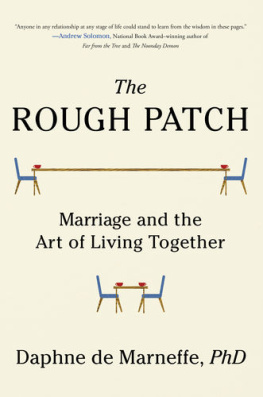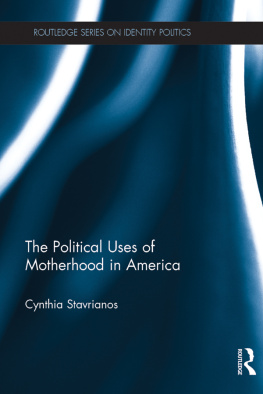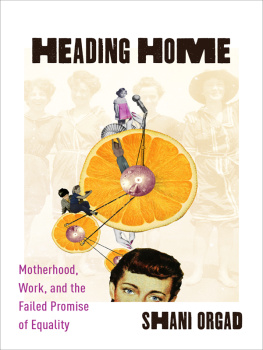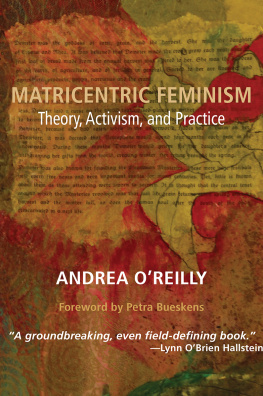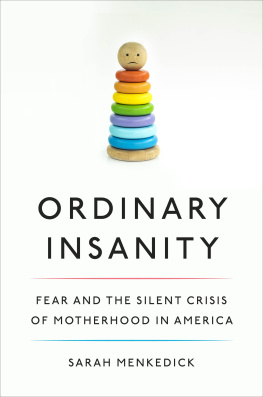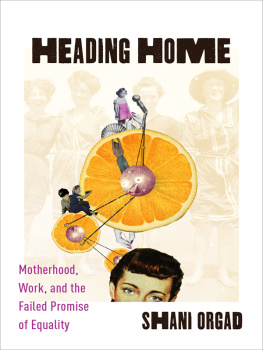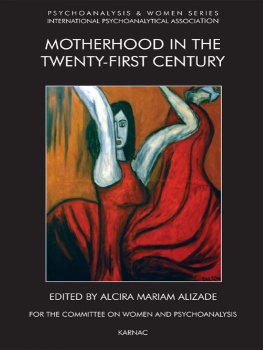Acclaim for MATERNAL DESIRE
Maternal Desire contains flashes of insight and expressions of deep sympathy, as when Ms. de Marneffe notes that our values inevitably determine what we consider to be our needs. She captures the exquisite conflicts that weigh on women, and... she writes movingly of the transfiguring effects of motherhood.
Patricia Cohen, The New York Times
De Marneffes book isnt so much about the desire to have children as the desire to spend time caring for them once theyre yours.... Her radical move is to urge women to think hard about what they themselves want or need from mothering, not just what their children want or need, and not what womens rights activists or psychological experts or right-wing politicians demand that they want or need.... Maternal Desire interweaves feminist history, psychoanalytic theory, subtle analyses of abortion and day care debates, and rich vignettes from de Marneffes own mothering life.
Elle
One of the complexities of thinking about motherhood is that its so hard to decide whator, really, whosecriteria to apply. Maternal Desire... speaks to something real about the way that many mothers feel these days, which is that they are failing to measure up, personally or professionally.
Elizabeth Kolbert, The New Yorker
In joining motherhood with desire and pleasure rather than obligation, Maternal Desire is a subversive book. It undercuts the opposition of self-development and emotional connectedness, and affirms a womans right to choose to spend time with her children. That this right is currently restricted to the economically advantaged is one of the scandals in our society. Maternal Desire demonstrates why women in our society will not really be free until all women have more power to shape their maternal lives.
Carol Gilligan
This is no sparkly-rainbow-and-dewdrop vision of mothering. De Marneffe, a mother of three, is clear-eyed about the demands of caring for small children. But as a clinical psychologist, she sees many women struggling to suppress a visceral ache to spend more time actively mothering.... Maternal Desire is an important addition to the literary canon on motherhood.
Stephanie Wilkinson, The Washington Post
Daphne de Marneffe has tapped into something powerful and true about motherhood. Rigorously intellectual, passionately researched, and above all enormously generous and inclusive of all mothersthis is a book that deserves to be a classic.
Dani Shapiro
Maternal Desire places mothering just where it seems to a father to belong: neither as a womans natural destiny nor as her inculcated duty, but as one of the chief desires of her lifea pleasure as real (and as problematic) as all her other pleasures.
Adam Gopnik
One of the most extraordinary books I have ever read... a brilliant, radical, and deeply poignant look at mothering and particularly womens desire to care for their children that should be required reading for all women. This beautifully nuanced, textured, and deeply accessible book helps put into words why it is sometimes so painful and difficult not to be at home, but never succumbs to any suggestion that this complexity can be remedied by a simple, functional solution.
Arietta Slade, PhD, Journal of the American Academy of Child and Adolescent Psychiatry
De Marneffe has a unique voice with an unusual capacity to hold the complexity of multiple perspectives. Recognizing the authenticity of different choices, she masterfully draws on current developmental theory to argue that womens subjectivity and sense of recognition can be found not only within the workplace but also within the mother-child experience. This remarkable, moving, and provocative book is about the passion of that experience.
Susan Coates, PhD, Columbia University Center of Psychoanalytic Training and Research
ALSO BY DAPHNE DE MARNEFFE
The Rough Patch: Marriage and the Art of Living Together

Scribner
An Imprint of Simon & Schuster, Inc.
1230 Avenue of the Americas
New York, NY 10020
www.SimonandSchuster.com
Copyright 2004, 2019 by Daphne de Marneffe
All rights reserved, including the right to reproduce this book or portions thereof in any form whatsoever. For information, address Scribner Subsidiary Rights Department, 1230 Avenue of the Americas, New York, NY 10020.
First Scribner trade paperback edition May 2019
SCRIBNER and design are registered trademarks of The Gale Group, Inc., used under license by Simon & Schuster, Inc., the publisher of this work.
For information about special discounts for bulk purchases, please contact Simon & Schuster Special Sales at 1-866-506-1949 or .
The Simon & Schuster Speakers Bureau can bring authors to your live event. For more information or to book an event, contact the Simon & Schuster Speakers Bureau at 1-866-248-3049 or visit our website at www.simonspeakers.com.
Interior design by Kyle Kabel
Cover design by Elixir Design SF
Cover photograph by John Dolan
Library of Congress Cataloging-in-Publication Data is available.
ISBN 978-1-5011-9827-4
ISBN 978-1-5011-9828-1 (ebook)
For Sophie, Alex, Nicholas, and Terry with love
Preface to the Second Edition
W hen preparing this updated edition of Maternal Desire , I asked my twenty-six-year-old daughter and her friends to read the books first edition. Much had changed societally in the fifteen years since Maternal Desire had first been published, and I wanted to find out what parts of the book spoke to them and what parts seemed irrelevant or dated. I was particularly curious whether the fear that motherhood spells the end of identity and agency was as alive and well in their peer group as it had been in mine. Id gathered from previous conversations that my daughter and her friends dont yet imagine having children, though most think that someday they will. They pass mothers with babies and little children on the street and undergo a mix of emotions common to ambitious young women in twenty-first-century America. They flinch from the notion of losing control over their bodies and emotions and time and feel a bit sorry for the harried moms (stroller-tethered people, as one called them). Yet they also experience a flicker of fascination that feels indulgent to bask in and disorienting to explore. Would the idea of maternal desire strike them as a remote abstraction, immersed as they were in fleshing out their adult identities in professional, creative, and sexual realms?
I was intrigued to discover that for this group of women in their midtwenties, Maternal Desire was gripping. They felt invited to engage and consider, rather than avoid or deflect, the complex questions for self and society that motherhood raises. It also spurred a subtle shift in their perspective on those stroller-tethered people. When I see mothers with their little kids now, one said, I am amazed at the nature of the labor. I feel more admiration and compassion for them and for my potential future self. Given that one of the books overarching goals was to bring about this shift in perspective, I was gratified to learn that it could still serve that purpose for a new generation of readers.
The second edition of Maternal Desire draws upon the feedback of these young women, as well as my own personal, professional, and parental development. Since the first edition, I raised three children to adulthood, which I discuss at points throughout these pages. I have seen scores of patients in psychotherapy, both couples and individuals, and these experiences have honed my thinking on parenthood and intimate relationships. They have also provided material for the illustrative vignettes that Ive added to this edition. (Where I offer clinical case examples, the persons described are composites.)
Next page
